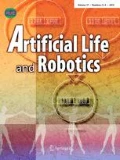Abstract
We investigate the effect of the ability to learn simple actions on the performance characteristics of the evolution of social behavior in agents situated in an inherently cooperative environment. Using a continuous predator–prey pursuit problem, we verified that relatively complex social behavior emerges from simple, implicit, locally defined, and thus robust and scalable interactions between the predator agents. Considering a distinct aspect of the phenomenon of emergence, we hypothesize that the ability of agents to learn how to perform simple, atomic acts of implicit interaction might facilitate the evolution of more complex behavior. The empirical results indicate that incorporation of the proposed approach to learning in genetic programming (employed as an algorithmic paradigm to evolve the social behavior of the agents) is associated with about a two-fold decrease in the computational effort of evolution.
Similar content being viewed by others
Author information
Authors and Affiliations
Corresponding author
Additional information
This work was presented, in part, at the 9th International Symposium on Artificial Life and Robotics, Oita, Japan, January 28–30, 2004
About this article
Cite this article
Tanev, I., Shimohara, K. Implications of the ability to learn simple actions on the efficiency of the evolution of social behavior of agents. Artif Life Robotics 9, 58–62 (2005). https://doi.org/10.1007/s10015-004-0335-3
Received:
Accepted:
Issue Date:
DOI: https://doi.org/10.1007/s10015-004-0335-3




